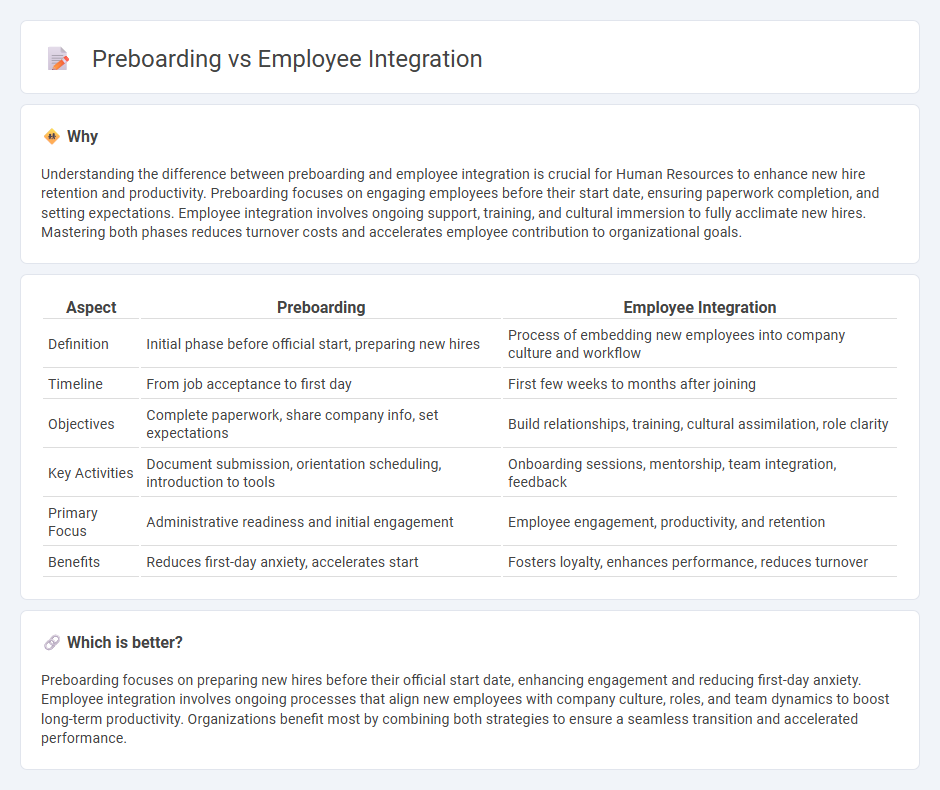
Preboarding involves the process of engaging new hires between the offer acceptance and their first day, focusing on paperwork completion, company policy introduction, and initial relationship building to ensure a smooth transition. Employee integration, or onboarding, extends beyond preboarding by immersing new employees into the organizational culture, roles, and team dynamics to boost engagement and productivity. Discover effective strategies to optimize both preboarding and employee integration for enhanced workforce retention.
Why it is important
Understanding the difference between preboarding and employee integration is crucial for Human Resources to enhance new hire retention and productivity. Preboarding focuses on engaging employees before their start date, ensuring paperwork completion, and setting expectations. Employee integration involves ongoing support, training, and cultural immersion to fully acclimate new hires. Mastering both phases reduces turnover costs and accelerates employee contribution to organizational goals.
Comparison Table
| Aspect | Preboarding | Employee Integration |
|---|---|---|
| Definition | Initial phase before official start, preparing new hires | Process of embedding new employees into company culture and workflow |
| Timeline | From job acceptance to first day | First few weeks to months after joining |
| Objectives | Complete paperwork, share company info, set expectations | Build relationships, training, cultural assimilation, role clarity |
| Key Activities | Document submission, orientation scheduling, introduction to tools | Onboarding sessions, mentorship, team integration, feedback |
| Primary Focus | Administrative readiness and initial engagement | Employee engagement, productivity, and retention |
| Benefits | Reduces first-day anxiety, accelerates start | Fosters loyalty, enhances performance, reduces turnover |
Which is better?
Preboarding focuses on preparing new hires before their official start date, enhancing engagement and reducing first-day anxiety. Employee integration involves ongoing processes that align new employees with company culture, roles, and team dynamics to boost long-term productivity. Organizations benefit most by combining both strategies to ensure a seamless transition and accelerated performance.
Connection
Preboarding enhances employee integration by familiarizing new hires with company culture, processes, and expectations before their first day, reducing onboarding time and increasing engagement. Effective preboarding activities, such as providing access to training materials and team introductions, foster a smoother transition and stronger workplace connections. This seamless continuum from preboarding to integration improves retention rates and accelerates productivity in human resources management.
Key Terms
**Employee Integration:**
Employee integration involves the ongoing process of acclimating new hires to company culture, workflows, and team dynamics, ensuring they become productive and engaged members of the organization. This phase typically follows preboarding and onboarding, emphasizing continuous support, training, and relationship-building to drive long-term retention and performance. Explore more strategies on optimizing employee integration for sustainable workforce success.
Onboarding
Employee integration involves the process of blending new hires into the company culture and workflows after their official start date, ensuring alignment with organizational goals and team dynamics. Preboarding refers to the set of activities completed before the first day, such as paperwork completion, access setup, and initial communication, aimed at reducing first-day anxiety and accelerating productivity. Explore how optimizing both preboarding and integration phases enhances the overall onboarding experience and drives employee engagement.
Socialization
Employee integration emphasizes ongoing socialization through team activities and mentoring, fostering a sense of belonging post-hire. Preboarding begins socialization earlier by providing new hires with company culture insights and connections before their start date. Explore how these strategies enhance workforce cohesion and productivity.
Source and External Links
5 Effective Ways to Optimize your Employee Integration Process - Employee integration can be optimized by streamlining onboarding with HR platforms, preparing work environments beforehand, personalizing the process, offering continuous feedback, and digitalizing training to ensure smooth new hire assimilation.
Onboarding and integration - UCnet - University of California - Employee integration is a strategic and ongoing process that immerses new hires into the company's culture and vision while providing tools and socialization to ensure successful role adoption.
15 Ways to Integrate New Employees - Together's mentoring software - Effective employee integration includes planning onboarding schedules ahead, conducting office or virtual tours, and publicly welcoming new employees to foster belonging and engagement from day one.
 dowidth.com
dowidth.com